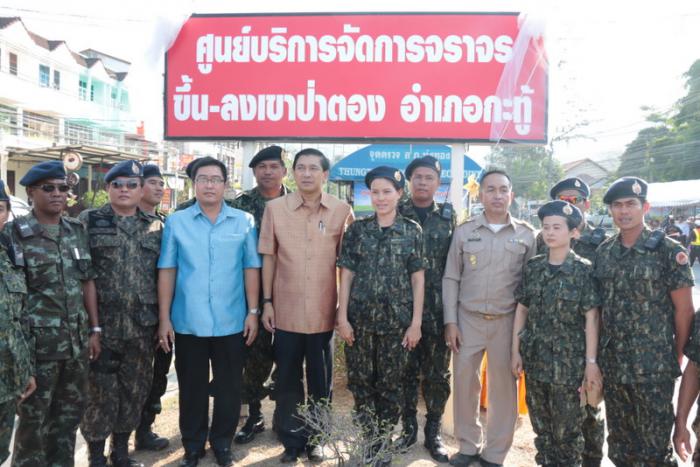Phuket tour bus drivers caught in Patong Hill checkpoint drug blitz

Note: Since this story was posted, a representative from the tour company Pegas Touristik affirmed that no drivers associated with the company tested positive for drugs in the blitz.
PHUKET: The new police and transport office safety checkpoint for buses about to cross over Patong Hill netted 16 drivers who tested positive for drugs in its first day of operation this week.
Officers tested 75 drivers at the new checkpoint, set up near the Thung Thong police checkpoint on Pra Barami Road (map here), on Monday.
“The drivers who failed the test had their licenses confiscated immediately and they were ordered to complete a four-month drug treatment program at Vachira Phuket Hospital,” Phuket Land Transportation Office (PLTO) Chief Terayout Prasertphol said.
“Their licenses will be returned – and they will be able to return to work – only after they have successfully completed the drug rehab.”
Mr Terayout said the drug testing was a long time coming.
“We warned tour bus operators at the beginning of the year that we would start drug testing bus drivers in Phuket (story here). Each operator was fined the maximum 40,000 baht for each driver who tested positive for drugs,” he told the Phuket Gazette.
The new checkpoint, which operates only on Mondays and Thursdays, was ordered by Phuket Governor Maitri Inthusut following the horrific bus crash on Patong Hill that claimed two lives and injured 26 people on December 29 (story here).
The first suggestion following the tragic accident was to ban heavy buses and trucks outright from travelling west across Patong Hill. The idea was later scaled back to preventing them from crossing the steep inclines during rush hours, a restriction that was already on the books but not enforced.
Then and now, officials are focused on brake failure problems and ensuring a smooth flow of traffic over the hill to help prevent them (story here).
Kathu District Chief Sayan Chanachaiwong hailed the new checkpoint a success.
“We improved traffic flow and got drug-using drivers off the road,” he said.
The traffic jam that the center’s inspections caused actually helped improve traffic flow by restricting the number of vehicles going over the hill, Chief Sayan said.
“The delay caused by the checkpoint can help prevent brake failure. Because there are fewer vehicles going up the hill at the same time, trucks and buses don’t have to use their brakes as often,” he explained.
Governor Maitri explained that other safety measures were in the works.
“We also have some ideas for improving traffic flow on the Patong side, such as not allowing cars from Phisit Gorani Road to turn right and ascend the hill. If we make those cars turn left and u-turn before climbing the hill, it will clear up some congestion on that side,” he said.
“And we’re going to improve the road itself. The Highways Department will repaint road lines, repair damaged areas and expand the road with the 15-million-baht budget they got this year.”
Officials are concerned about road safety on all roads, but want to focus on Patong Hill first because of the high number of accidents there, he added.
Last November, a tour bus carrying 49 students crashed, seriously injuring one student (story here); in September a tour bus without passengers crashed into a house (story here); in June five Russian tourists were injured when their tour bus crashed descending into Patong (story here) and in February, a tour bus hit a motorcyclist and crashed into a utility pole, causing a three-hour traffic jam (story here).
In the first accident, the bus was unable to ascend the steep incline; the three other cases involved brake failure.
As recently as yesterday, a safety-consciousness bus driver avoided danger by pulling his bus, carry Chinese tourists, off the road before the steep decline after he realized his brakes were failing (story here).
— Saran Mitrarat
Latest Thailand News
Follow The Thaiger on Google News:


























